
Medically reviewed by Scott A. Johnson, AMP, CEEOS
26 Home Remedies for Wheezing – Facts, Symptoms, Preventions
Updated: 6/15/2019
CONTENTS
I – What Is Wheezing?
Wheezing is a common symptom of many lung diseases that can lead to difficulty in breathing. Wheezing can be chronic or acute. Wheezing occurs due to an obstruction in the flow of air in your lungs [1]. When you make a high-pitched whistling sound when breathing, it means that you are suffering from wheezing. In most cases, wheezing will happen when you breathe out which is called expiration. However, sometimes, it is related to breathing in which called inspiration. In severe cases, people can hear the sound. Wheezing is caused by inflammation and narrowed airways. When you have the symptoms of wheezing or coughing, you should figure out the causes. If the symptoms are serious, you should make an appointment with your doctor because wheezing may be one of a serious problem that needs medical care.
II – What Are Causes Of Wheezing?
There are several causes of wheezing. Common causes of wheezing include a chronic respiratory disease like bronchitis, asthma, pneumonia, or emphysema [2].
Wheezing is commonly caused by narrowing of the airways, which leads to difficulty in breathing. There are many causes of narrowing of the airways, for example, an inflammation caused by asthma, an allergic reaction, an infection, or by a physical obstruction such as inhaled foreign objects and a tumor.
Chronic obstructive pulmonary disease (COPD) and asthma are the common triggers for wheezing. However, wheezing has several other potential causes. Other triggers that increase the risk of developing wheezing may include allergies, heart failure, anaphylaxis, bronchiectasis, bronchitis, childhood allergies, emphysema, epiglottitis, GERD, lung cancer, medications, pneumonia, respiratory tract infection, sleep apnea, obstruction, smoking, and vocal cord dysfunction.
When you meet a doctor, he or she can help you figure out the specific hidden causes of this condition. Besides emphysema, asthma, pneumonia, and bronchitis, wheezing is also one of the signs and symptoms of gastroesophageal reflux disease, lung cancer, heart failure, vocal cord dysfunction, or sleep apnea. Other short-term health problems and illnesses such as reaction to smoking, respiratory tract infection, anaphylaxis or inhaling a foreign object also result in wheezing and coughing.
III – What Are Risk Factors For Wheezing And Coughing
Wheezing may appear at any age. Certain risk factors increase the risk of wheezing and coughing, such as:
AllRemedies Partner Solutions

Keep Asking Questions Until You Get The Answer You Need!
The Medical Experts are all here to answer your questions online or with a phone call.
- Patients with lung cancer
- Patients with allergies
- Toddlers or children in daycare because they are often exposed to infections
- Current and past smokers
It is essential for you to control the risk factors like smoking to make the wheezing become better. You can avoid triggers that increase the risk of wheezing and coughing, such as pollen and allergens.
When you suffer from wheezing and coughing, it means that your upper respiratory tract gets irritated, infected, or blocked. It is said that wheezing and coughing may keep you from sleeping and these problems will make you tired and unpleasant.
IV – When Do You Have To Seek Medical Care?
When you make an appointment with a doctor, you should tell him the first time you suffered from wheezing. The doctors need to know your health history to figure out whether you have serious breathing problems. In most cases, wheezing can be treated by using over-the-counter medications or applying home remedies. However, if you have hives, difficulty breathing, or a swollen throat or face, you should seek medical care.
V – Natural Home Remedies For Wheezing And Coughing – Effective Techniques That Can Work
In this article, we would like to introduce the readers of AllRemedies the effective natural remedies for wheezing and coughing. These natural solutions should be combined with medical treatments to hasten the healing process and ease unpleasant symptoms. When you see the symptoms such as rapid breathing, difficulty breathing, and briefly bluish skin color, you need to make an appointment with the doctor to get diagnosed.
If you want to read more about effective home remedies for other diseases, please visit our Home Remedies Page.
1. Ginger
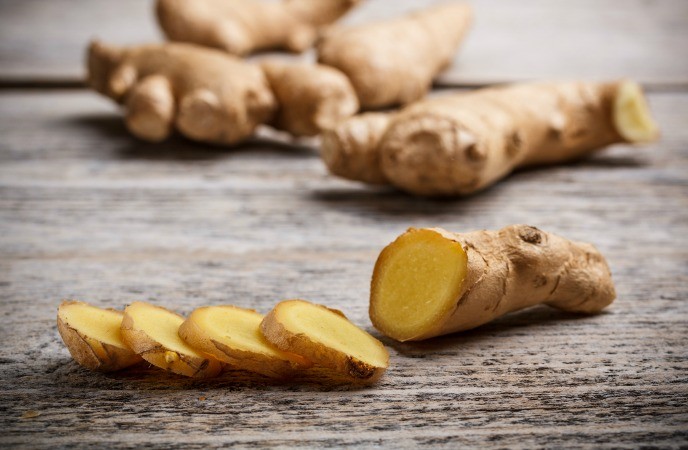
If you ask for the effective home remedies for wheezing, you should not skip ginger. Ginger is a well-known remedy for a variety of ailments, including asthma, coughing, and wheezing.
Many scientists and researchers have shown that ginger is effective in alleviating airway inflammation and preventing airway contraction. Moreover, studies have found that compounds in ginger, which may enhance the muscle relaxant effects of wheezing and asthma drugs [3].
In order to use ginger as the natural home remedy for wheezing, you should mix the ginger juice with pomegranate juice and honey in equal quantities. You can consume one tablespoon of this juice twice or three times a day.
Another way is to add one teaspoon of ground ginger in a half cup of water. It is recommended consuming one tablespoon of this solution before bedtime in order to prevent wheezing from interrupt your sleep.
You can make the ginger tea by cutting one inch of ginger and putting it in a pot of boiling water. Let it steep for about five minutes and then wait until it cools down. Drinking ginger tea every day will ease the unpleasant symptoms of wheezing naturally. Moreover, steaming from ginger tea will relieve the difficulty in breathing.
If you want to detoxify your lungs, you can make a fenugreek decoction by putting one tablespoon of fenugreek seeds into a cup of boiling water. Add one teaspoon of ginger juice and sufficient honey into this mixture. Cover it and let it steep for a while. It is advisable to drink this mixture in the morning and in the evening to get significant relief.
In addition, eating raw ginger with a little added salt also works for patients with wheezing and coughing.
2. Mustard Oil

Mustard oil has many benefits for your health. Mustard oil gains great reputations in different areas of the world for ages. It is known as popular oil on the Indian Subcontinent, particularly in Bangladesh and Eastern parts of India. However, the benefits of mustard oil remain controversial. In some countries, mustard oil is used as edible oil, which is healthy and safe while the rest of the world thinks that it is irritating, toxic and not suitable to be used as edible oil. This oil is banned from being sold in some parts of Europe while it is sold as the massaging oil, which is used for topical application only in some countries. However, it is said that when you suffer from wheezing caused by asthma, massaging with mustard oil will give you significant relief. The possible reason may be that mustard oil has stimulant, antibacterial and antifungal properties; therefore, it will help you to unblock the respiratory passages and restore the usual breathing [4]. In order to use mustard oil as one of the effective home remedies for wheezing and coughing, you should heat mustard oils with sufficient camphor. When it is done, you pour the mixture into a bowl and then let it warm for a while. After that, you can rub it gently on the upper back and chest. Massage it in circular motions for a couple of minutes. It is recommended doing this treatment several times a day until the symptoms of wheezing and coughing disappear.
However, when you purchase mustard oil, you should distinguish the mustard oil and mustard essential oil, which sometimes make customers confused. Both mustard essential oil and mustard oil are taken from the seeds of mustard, but they are different in the process of contraction, medicinal properties, and chemical composition. By cold compression of mustard seeds, we get mustard oil. The mustard essential oil is extracted by soaking the seeds of mustard in water and with steam distillation method.
3. Fig
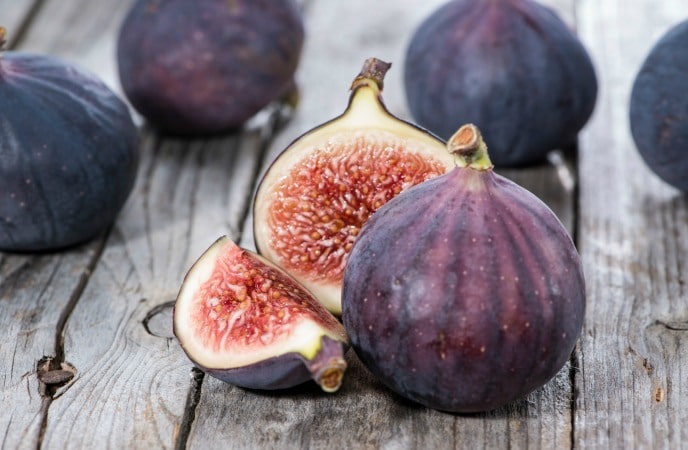
Figs, a fruit of ficus tree, have a great source of fiber, vitamins, and minerals. This fruit has been known as the healthy and versatile ingredient which can make all kinds of dishes sweeter. Figs taste sweet, unique with crunchy edible seeds and chewy, soft texture. Because of high fiber content, figs are said to act well as a natural laxative. Moreover, this fruit is recommended if you want to find an effective way to nourish and tone membranes. Potassium in figs helps them to become an excellent treatment for high blood pressure and low blood pressure. Therefore, with nutritional content and valuable properties, it is not surprising when figs may become one of the natural home remedies for respiratory infections, including wheezing that you should know [5]. Along with treating wheezing and coughing, figs are effective in alleviating respiratory tract symptoms, draining phlegm, and reducing breathing difficulties. Using fig treatment for wheezing and coughing, you should wash these dried figs and soak them in water. Leave it and go to bed. In the morning, after you wake up, you can eat soaked figs and consume figs water. It is recommended using this treatment when your stomach is empty. You should continue doing this treatment for a couple of months if you want to have a more satisfactory result.
The best seasons for you to buy figs are summer and autumn. Because fig is easily delicate and perishable, it is better to consume it within one or two days after you buy. You should choose the tender and plump figs with deep color. When buying, you should make sure that these figs do not have bruising. Ripe figs will show a sweet fragrance. When you purchase ripe figs, you should not wash them until you are ready to eat. The ripe figs can be stored in the refrigerator for up to two days. If the figs are not ripe, you can keep it in the room temperature in order to let it ripen. It is said that dried figs can be kept longer than fresh figs. When you buy dried figs, it is essential to make sure that they are soft and free from mold. You can eat figs, either peeled or unpeeled, which depends on the thickness of fig skin and personal choice.
However, you should consume figs in moderation. The reason may be that figs are rich in oxalates. Eating too many figs will lead to a laxative effect.
4. Garlic
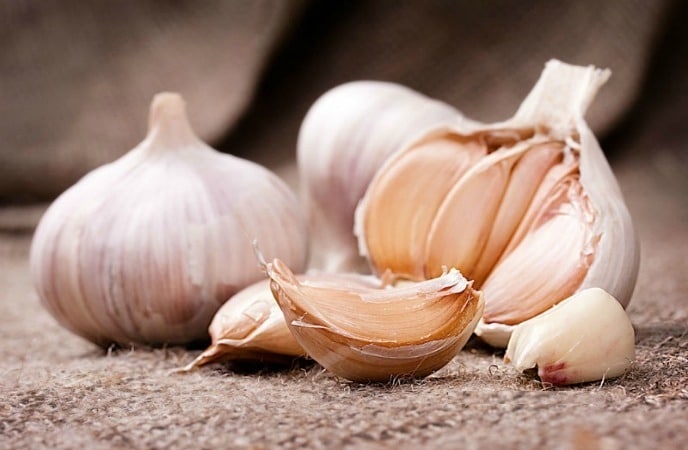
If you want to know the effective home remedies for wheezing and coughing, as well as the ways on how to prevent other respiratory ailments, you should not skip garlic [6]. Many studies and evidence showed that compounds in garlic will help you to clear congestion in your lungs as well as alleviate and treat symptoms related to other respiratory ailments. It is said that one of the key nutrients that help you to fight against wheezing is vitamin C [7]. Garlic has more than twice as much vitamin C as tomatoes. Vitamin C which is naturally present in garlic plays an important role in neutralizing free radicals and unstable molecules; as a result, it is useful in inhibiting the contraction of the airway [8]. Moreover, vitamin C will reduce the histamine release in your body. Histamine, which is the natural chemicals in your body, will release due to many allergic reactions [9]. Histamine is said to promote inflammation in wheezing patients.
You can add garlic as a flavor enhancer for your favorite dishes. However, if you ask for the traditional folk medicine, you can try warm garlic milk. Garlic milk is considered as the age-old remedy for wheezing and coughing. To make garlic milk that helps you to fight against wheezing and coughing, you should take eight garlic cloves. After that, peel and crush them. Place the crushed garlic into a heat resistant pot. Add a ¼ cup of cold organic milk and boil this mixture. Use a wooden spatula to stir this mixture regularly. You should not forget to stir this mixture because it will keep the solids from sticking to the bottom of your pan. And then strain the garlic. Allow this liquid to cool down. Drink this mixture when it is warm.
When you consume the raw garlic or drink garlic milk in moderation, it will not cause any unwanted side effects. However, in some people who include garlic in the wheezing fighting diet, there are mild side effects such as heartburn (most occurring in pregnancy), body odor, increased respiration, stomach problems such as lightheadedness, diarrhea, or unpleasant burning sensation happening in your mouth and stomach. Moreover, the external application of garlic may lead to skin irritation and rashes in some people. Therefore, it is essential to let your doctor know about the drugs and medications you are using and ask him whether they interact with compounds in garlic before using garlic as the diet or treatment for wheezing and coughing as well as other respiratory ailments.
5. Coffee

Drinking coffee daily will help you to ease the symptoms associated with asthma and wheezing. It sounds strange, does not it? We all hear about the harmful effects of caffeine, and many people believe that they should give up a coffee drinking habit. However, it is not true. If consumed in moderation, caffeine will bring several health benefits. One of its benefits is treating wheezing caused by asthma [10]. According to Anahad O’Connor, the structure of caffeine resembles the structure of a common wheezing fighting medication which may help to relax the airway muscle and alleviate respiratory problems. In 2007, many researchers in a study of the Cochrane Database of Systematic Reviews tried to analyze the effects of caffeine on treating wheezing and asthma after doing a half dozen clinical trials. They found a small improvement in airways in people who had consumed caffeine. The study also showed that a cup of coffee will improve the lung function for about two hours [11]. Therefore, if you want to look for the momentary relief for wheezing and coughing, you need a cup of hot coffee. It is time for you to replace the handy inhaler for a cup of hot black coffee. Coffee will act as a bronchodilator; hence, it will control and prevent wheezing attacks. The stronger the coffee is, the more satisfactory result you will get. However, you do not drink more than 3 cups of coffee daily because the caffeine in the coffee will like to some side effects if consumed in excess. If you do not like black coffee, you can substitute for black tea, which has the same benefits. It is said that the improvement in asthma and wheezing is slight. Therefore, it is not enough to use coffee as a replacement for medication and regular treatment. Because consuming too much caffeine will lead to some unwanted side effects, doctors will suggest the patients with wheezing take that medication in order to control their consumption of tea, coffee, chocolate, and other foods containing caffeine.
6. Eucalyptus Oil

If you experience wheezing, coughing, and breathing difficulties, eucalyptus oil may be one effective remedy for you. It is said that eucalyptus oil is effective in treating many health problems, such as wheezing, chest tightness, insect bites, fatigue, and sinus congestion. Eucalyptus oil is extracted by pressing the leaves of native Australian trees which have different sizes, shapes, and varieties. Thanks to containing antimicrobial properties, eucalyptus oil is effective for treating diseases related to the respiratory system such as sinusitis, strep throat, asthma, bronchitis, cough, etc. as well as their symptoms like wheezing [12]
In order to use eucalyptus oil as one of the effective home remedies for wheezing and coughing, you will need to boil water, a large bath towel, and eucalyptus oil. Firstly, you should place a pot of water on the and bring it to a boil. When the water is boiled, you turn off the heat and then let it cool down for 1-2 minutes. Place the pot on the surface of the kitchen table or any flat surface and add one to three drops of eucalyptus essential oil into the water. Next, lean over the steam and close your eyes. You should use a large towel to cover your head in order to prevent the steam from escaping. You should be careful as the steam may burn your face. Try to breathe deeply and slowly. It is said that the combination of steam and eucalyptus oil will open your breathing passages and ease the symptoms associated with wheezing naturally and effectively.
Alternatively, you can pour 3-4 drops of eucalyptus oil on the paper towel and keep this towel by your head when sleeping. This treatment will make you breathe easily and sleep better.
If you want to have a more positive result, you should repeat the treatment several times a week and for a few months until the symptoms of wheezing and coughing disappear.
7. Honey

Honey is mentioned as a natural alternative treatment that may help you to ease wheezing and coughing. Honey will alleviate the mucous membranes in your airway passages. Mucus accumulation in airway constriction is one of the triggers of wheezing [13]. Moreover, honey is effective in treating coughing in children at night [14]. However, because there are many different types of honey available in the market, it is essential for you to know which the best type to treat wheezing and coughing is. You should choose dark honey like buckwheat honey because it has excellent nutritional quality for your health [15]. You can purchase honey from the health food store or the local grocery store. Alternatively, you can add one teaspoon of honey in a glass of warm water. It is recommended consuming slowly three times daily to get a satisfactory result.
If wheezing interrupt into your sleep, you can mix the mixture of one-half teaspoon of cinnamon powder and one teaspoon of honey. Consume it before bedtime in order to find significant relief. It is said that this mixture is effective in removing phlegm from your throat and let you sleep better.
However, it is important to know that honey will increase the risk of botulism in infants. Therefore, babies under one year should avoid consuming honey. Before using honey as regular form of wheezing treatment, you should consult a doctor first. Honey may help you to alleviate wheezing and coughing. But it is still better to use honey along with a long-term controller medication that reduces airway inflammation.
It is said that if you want to have a positive result, and the symptoms associated with wheezing disappear completely, you should repeat the treatment regularly.
8. Carom Seeds

Carom seeds, which are also called Bishop weed, may be used to treat many health problems. Carom seeds may be used both in cooking and as an ingredient in several medicines. It has been known for medicinal properties in ancient times. It tastes bitter and hot. Because carom seeds contain decongestant properties, it will help you to fight the relief from wheezing and coughing. Moreover, it also has antibacterial and antifungal properties [16][17].
The simplest way on how to reduce wheezing and coughing with carom seeds at home is adding one teaspoon in a pot of boiling water. Place the pot on the table or any flat surface. After that, you can use a towel to cover your head to make sure that the steam does not escape. Lean over a pot of boiling water and try to inhale the steam slowly and deeply. The steam will help to open your airway passages and make you breathe easily.
Alternatively, you should add some carom seeds in a cup of boiling water. Cover it well and let it steep for a couple of minutes. After that, you can allow it to cool down and drink it. You should drink this water several times a day and for a few weeks until the symptoms of wheezing disappear.
Another way on how to use carom seeds to treat wheezing is heating a handful of carom seeds in a microwave for a couple of minutes. After that, you should wrap them in a piece of cotton cloth. When it is still hot, you should place it on your neck and chest. Remove it when it cools down. If you want to achieve a satisfactory result, you should repeat this treatment daily.
Moreover, you can mix carom seeds and jaggery in equal quantity to create the paste. Heat the paste on the microwave for a couple of minutes. If you want to treat wheezing and coughing, you should eat this paste twice a day and for a couple of days until the symptoms of wheezing and coughing disappear completely. People who get diagnosed with diabetes should not use this treatment for wheezing and coughing.
9. Flax Seeds
It is said that flaxseeds contain antibacterial properties and it is rich in omega 3 fatty acids; therefore taking flaxseeds regularly will help you to alleviate wheezing and coughing [18] [19]. Moreover, it will prevent the occurrence of wheezing. In order to keep this problem at bay, you should consume a teaspoon of extracted flaxseed oil daily. Moreover, you can also chew half a teaspoon of flax seeds daily to prevent and treat wheezing and coughing.
10. Ginkgo Biloba

Ginkgo biloba has been used as a medicinal treatment for many health problems for ages. Today, it remains a top-selling herb, and many people in the United States like this herb. Many scientific investigations have proved the benefits of ginkgo biloba for health. Available evidence showed that ginkgo biloba is effective in treating anxiety, dementia, schizophrenia, and cerebral insufficiency.
Moreover, in China, ginkgo biloba has been used for hundreds of years for curing wheezing and coughing. Moreover, using ginkgo biloba treatment also helps you to improve the function of the lungs [20] [21]. You can drink this herbal tea to keep wheezing and coughing under control. Add ginkgo biloba in boiling water. Steep this solution for a couple of minutes. When you finish, you should allow it to cool down for a while. It is recommended taking this solution several times a day for a few weeks until the symptoms of wheezing disappear completely.
Moreover, you can take it in tablet form. However, before taking in tablet form, you should consult your doctor first to know how much you should take and whether it has unwanted side effects. It is better to combine ginkgo biloba with other excellent and effective herbal remedies for wheezing such as ginger or garlic for increasing efficiency of this treatment and getting the maximum result.
However, it should be noted that patients who were diagnosed with clotting disorder or take blood thinners should avoid using this treatment. Furthermore, before surgery or dental procedures, ginkgo biloba should also not be taken due to many reports of bleeding.
11. Turmeric
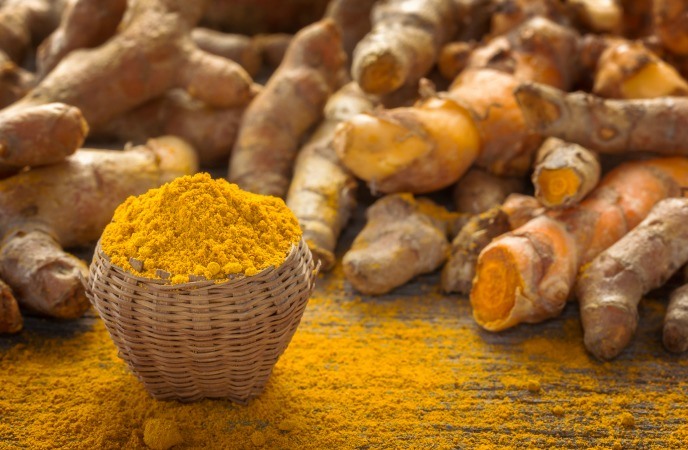
Because of anti-inflammatory and antioxidant properties, turmeric should be included in the list of natural home remedies for wheezing and coughing. Wheezing may cause inflammation of the lining of the airways and lungs. Instead of using some medicines to get rid of inflammation, you can choose turmeric as a natural herb to treat wheezing [22]. Therefore, you should you turmeric powder for quick relief. Turmeric is the root of the plant Curcuma longa. Like ginger, turmeric may be used as the flavor enhancement or as a therapeutic agent. Chinese and Indian have used turmeric as medicine to treat many health problems for hundreds of years. It has a yellowish orange color. It tastes slightly bitter and peppery. It is said that turmeric is a great source of potassium, magnesium, vitamin B6, iron, and fiber [23]. The anti-inflammatory properties of turmeric will help you to alleviate inflammation of the airway and relieve tightness of chest associated to wheezing.
The simplest way is to take half a teaspoon of ground powder of turmeric and add it in a glass of warm water. Stir it well and make sure that the turmeric powder is dissolved completely in this water. You can improve absorption of the bioactive compounds (like curcuminoids) found in turmeric by consuming it with a meal. Drink this solution daily until the symptoms of wheezing disappear. You should continue doing this treatment; as a result, you will get better control of wheezing soon.
If you want to relieve congestion of bronchi, you should mix half a teaspoon of turmeric powder with sufficient salt. After that, add the mixture into a glass of hot water. Moreover, you can mix one teaspoon of turmeric powder with a ½ teaspoon of honey and consume this mixture to get significant relief. This treatment should be repeated several times.
If you want to eliminate phlegm, you can mix banana ash, turmeric powder, and barley powder in equal quantity. Consume this paste four or five times daily in order to achieve the maximum result.
Wheezing may lead to irritation of bronchioles. You can find the relief for this problem by mixing ghee, turmeric powder, and black pepper powder to create the fine paste. Use this paste to massage your chest.
If you suffer from frequent wheezing, it is recommended keeping turmeric at home. In order to store the nutritional value and prevent this herb from getting mold infestations, you should store it properly. You should purchase turmeric from herbal stores which you can trust for giving natural herbs. Many people make a mistake when believing that the color of turmeric indicates the quality of turmeric. If you can not find turmeric powder in your local stores, you can make it at home by boiling, drying and then grinding the dried roots of turmeric. It is recommended buying organic turmeric. You should store turmeric powder in the sealed tins and keep them in the dark, dry, and cool place. The fresh root turmeric should be stored in the refrigerator.
However, using turmeric may give you quick relief for about 10 minutes. If turmeric treatment may not work for your wheezing, you should seek for other natural treatments or medical attention.
12. Sesame Oil
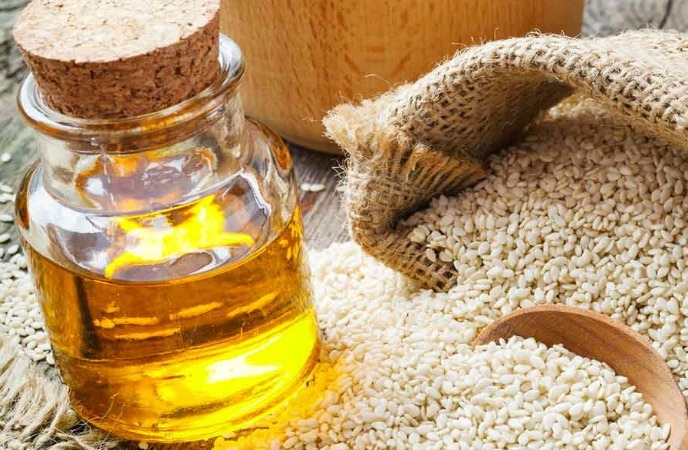
Like mustard oil, sesame oil is also one of the effective home remedies for wheezing and coughing at home [24].
In order to treat wheezing, you should mix 100 ml sesame oil with half a teaspoon of asafetida and a little camphor. Mix them well to create the fine thick paste. After that, store this paste in a dark colored bottle. When you experience wheezing and coughing, you should take this paste to massage your chest as well as your upper back gently to find the significant relief for wheezing. You should do this treatment daily for a few weeks in order to treat wheezing completely.
13. Red Chili
Red chili is one of the most popular spices which are well-known for health and medicinal benefits. Chili has a strong spicy taste; therefore, it is used as a flavor enhancement in many dishes. Red chili may provide you many nutritional values, such as vitamin A, vitamin C, vitamin B6, iron, potassium, and copper [25]. Many experiments on mammal suggested that capsaicin, an alkaloid compound in chili, contains anti-bacterial, analgesic, and anti-carcinogenic properties [26]. Eating red chili will help to open the air passages; therefore, red chili is considered as one of the effective home remedies for wheezing related to asthma [27]. Moreover, they also help to thin the mucus of throat, mouth, and lung. As a result, you can breathe easily. Therefore, it is highly recommended adding red chili in your favorite dishes to treat and prevent wheezing.
Red chili may be available in many forms such as fresh, powdered, or dried form. You can buy red chili in the market. In the stores, you should purchase fresh red chili instead of powder. You should look for the fresh red chili with brilliant color (depending on the variety, it may be orange, red, green or yellow) and with healthy stalk. The best red chili you choose should be free from spots and molds. At home, you can place red chili in the plastic bag and store it in the refrigerator. The freshness, nutritional values of red chili may be maintained for up to one week. You can buy dried red chili in the market too. When you take dried chili at home, you should store it in the dark, cool, and dry place with the room temperature. Dried red chili can be stored in airtight containers for many months without nutritional value loss.
14. Licorice Tea
It is said that licorice tea is one of the effective home remedies for wheezing and coughing that you should not ignore [28]. In order to use this treatment, you should crush a long licorice root and soak it into two cups of water. Steep and boil it for about 10 minutes. In order to get sufficient results, you should drink this tea daily. Moreover, in addition to licorice tea, ginger tea also has the benefits of treating wheezing and coughing. Put one teaspoon of grated ginger into two cups of boiling water. If you like, you can add one teaspoon of honey into this solution in order to enhance the effectiveness of this treatment.
15. Sip Lobelia Tea

If you want to ask the effective home remedies for wheezing and coughing at home, we would like to introduce to you lobelia tea as the wonderful treatment. Lobelia is a popular herb which is well-known as a treatment for allergies, asthma, whooping cough, bronchitis, and congestion [29]. This herb is easily found in the southeastern part of Canada. Moreover, this herb also grows in the eastern half of the United States. In order to use lobelia as the treatment for wheezing and coughing, you should make tea and drink it. However, it is important to know that drinking this tea too quickly may result in vomiting. Therefore, you should take small sips and slowly. However, because lobelia has been considered as the toxic herb due to its lobeline affiliation, you should consult a doctor before taking this treatment. It is better and safer to begin with a lower dosage and increase the dosage gradually. You need to take less than 20 mg per day in order to avoid any unwanted side effects. Taking 600 to 1,000 mg per day is considered toxic and 4,000 mg may be life-threatening. In addition to lobelia tea, you can take lobelia in different forms, such as vinegar tincture, a fluid extract, or in capsules.
16. Use Home Vaporizer
A home vaporizer is the folk remedy that helps you to treat wheezing and coughing naturally and effectively. Although you have done a lot of approaches to alleviating wheezing, you still need to use a vaporizer to enhance the wheezing fighting treatment’s effectiveness [30]. In order to make home vaporizer, you should take one liter of water. It is recommended using non-chlorinated water. Boil water and add a few drops of pure peppermint oil in this solution. Remain the low heat when the water evaporates. During this treatment, you should make sure that all the doors are closed. The amount of water and peppermint oil depends on the size of your room. If your room is big, you need more water and peppermint oil. For a better result, you will need a temporary tent with a sheet when inhaling the vapors.
17. Fenugreek Seeds
Fenugreek seeds treatment is an Ayurvedic remedy which has been used to treat wheezing and coughing for ages. The combination of honey, fenugreek seeds, and ginger is effective in alleviating the symptoms of wheezing. Honey is considered as a good ingredient for your respiratory tract. Ginger has components such as shogaols, gingerols, and zingerones, which contain analgesic and anti-inflammatory properties. Therefore, these properties make this remedy beneficial for curing wheezing. According to the American Thoracic Society International Conference, when ginger compounds are added to isoproterenol, an asthma medication, it becomes more effective. Fenugreek seeds are wonderful home remedies for wheezing caused by bronchitis and asthma [31].
In order to do this treatment, you will need two tablespoons of fenugreek seeds, two teaspoons of ginger paste (grind from the fresh ginger root), one teaspoon of honey and one liter of water. Firstly, you should put fenugreek seeds into the water. Leave for half an hour. After that, strain the water. Extract the ginger juice from ginger paste with the help of a sieve. Pour the ginger juice into the strained water. Add a little honey into this mixture and mix all the ingredients well. In order to treat wheezing, you should take a glass of this solution made from ginger, fenugreek, and honey every morning to get the best result.
18. Drumstick Leaves
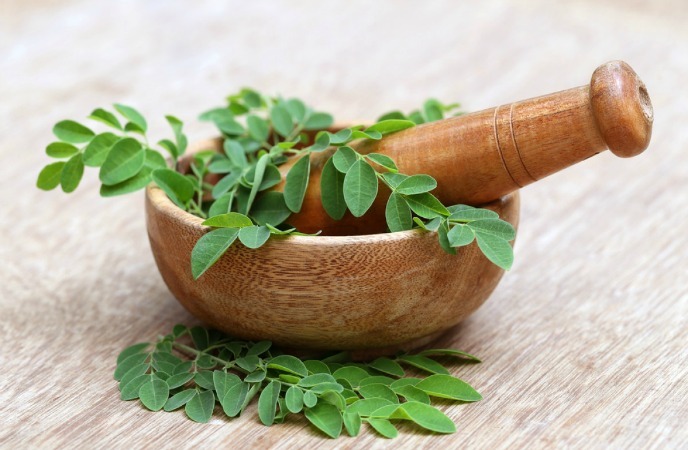
Drumstick tree is also known as Moringa tree. Various parts of this tree may be used to treat different ailments and problems. Drumstick leaves are well-known as effective home remedies for wheezing and asthma [32]. You can use drumstick leaves to make a soup. Many studies and researches showed that drumstick leaves have alkaloid, which contains decongestant properties. Therefore, it is effective in treating wheezing and asthma. This alkaloid will help to relax bronchioles. If you suffer from wheezing, you should prepare the soup made from drumstick leaves to get quick relief.
In order to make this soup, you will need a handful of drumstick leaves, a ¾ cup of water, salt (if you want), pepper, and one teaspoon of lime juice. Firstly, you should put the drumstick leaves in water and boil it for about five minutes. Allow it cool for a while. You can eat this soup when it cools down. However, if you want to add more taste, you can mix it with pepper, salt, or lime juice. Take this soup every day in order to prevent and treat wheezing.
19. Bitter Gourd Root
This Ayurvedic remedy for wheezing has been proven by modern research conducted by the University of Massachusetts Medical School. It found that certain bitter flavors may help to treat wheezing fast and effectively. Therefore, bitter gourd rood should be included in the list of effective home remedies for wheezing. This research also suggested that bitter flavors may ease the contraction of airway cells. This process of easing the contraction of airway cells is known as bronchodilation, and it may treat many airway obstructive diseases, including wheezing. Therefore, if you suffer from wheezing, and it makes you uncomfortable; you should take some bitter gourd root immediately [33].
In order to treat wheezing with bitter gourd root, all the things you should need are one teaspoon of bitter gourd root paste and one teaspoon of honey. You can replace honey with one teaspoon of holy basil leaves juice if you like. Firstly, if you have bitter gourd root, you should grind it to create the paste. Mix this paste with honey. If you use basil leaves, you need to crush them to take the juice. It is recommended taking this bitter gourd root made by mixing with basil leaf juice or with honey every night before you go to bed.
In addition, it is advisable to build a healthy diet and lifestyle to not only reduce the risk of wheezing and coughing but also help the treatment effectively. Here are specific prevention methods for wheezing and coughing:
20. Keep Your Living Environment Clean
By eliminating the irritations in the air, you can reduce the risk of wheezing. It is important for you to keep your living environment clean most of the time [34].
You should weep, clean, and vacuum your room regularly. If your home has pets, vacuuming is necessary to get rid of dander and fur in your house.
Furthermore, you should pay attention to the heating and cooling system in your home because they usually have respiratory irritants.
21. Avoid Potential Allergens
To keep wheezing and coughing at bay, you should avoid potential allergens, especially the foods. Asthma – a cause of wheezing may become severe if asthmatic people eat the food that they are allergic [35]. If you do not know what your allergens are, you should ask your doctor for a test.
22. Keep Away From Potent Smells
Strong smells may make the condition worsen. Therefore, if you are experiencing wheezing and coughing, you should avoid chemical odors such as paint or chemical cleaners. Scented shampoos or perfumes should not be used if you are using treatments for wheezing [36].
23. Keep Warm In Cold Weather
The cold air increases the risk of wheezing and coughing by stressing your airways. Therefore, you should keep warm in cold weather as a great prevention for wheezing. It is recommended using a scarf to cover your nose and mouth when you have to go out. Moreover, the scarf may help you avoid any respiratory viruses affecting you [37].
24. Keep Hydrated
It is better to drink at least eight glasses of water daily to prevent wheezing. Drinking water may remove the mucus that accumulates in the airway [38].
Besides plain water, you can drink herbal tea and citrus juice as the treatment and prevention of wheezing [39].
25. A Balanced Diet
A healthy diet may prevent not only wheezing but also numerous health problems. You should increase the intake of nutrients to lower the risk of wheezing.
- If wheezing is caused by asthma or anxiety, a balanced diet may work. You should eat more fruits and vegetables to enhance your health [40]. As mentioned above, vitamin C is effective in preventing your health in general and the wheezing in particular. You can have an intake of vitamin through acidic fruits such as lemon, orange, pineapple, gooseberry, etc. Besides consuming vitamin C through foods, you can take vitamin C supplement instead, if you do not have time. However, the amount of vitamin C should depend on the age. Specifically, an adult needs only 60 mg of vitamin C. It is recommended to take less than 1,000 mg of vitamin C daily in order to avoid any unwanted side effects. Consuming too much vitamin C will cause stomach pain, diarrhea, and flatulence. These symptoms will vanish when you stop consuming vitamin C supplements. It is important to consult the doctor before taking vitamin C supplements.
- Furthermore, omega-3 fatty acids are good for your lungs. You can find omega-3 fatty acids in sardines, salmon, and mackerel [41].
- Consuming yogurt may not treat your wheezing directly, but it may help improve your immune system resulting in preventing the inflammation [42]. Therefore, remember to eat yogurt daily.
26. Exercise
Exercise may help prevent wheezing you should not ignore. Breathing exercise is effective in improving the capacity and strength of your lung [43]. You can do meditation or yoga for this purpose [44].
Furthermore, you can do cardiovascular exercise daily. You do not need a long-hour or intense workout. 15 to 30-minute exercise can work effectively if you do it daily.
VI – Conclusion
We hope that after reading this article, you can find the most suitable remedy for you to treat wheezing. Although these remedies are considered safe for most people because these ingredients are natural, it is essential to test these ingredients before using to make sure that they will not cause any allergic problems for you or make your problems become more serious, especially when you are pregnant or for children. Therefore, be careful before using an ingredient.
However, all content provided are for informational & educational purposes. We recommend you consult a healthcare professional to determine which method is appropriate for you and decide that you have to take medicine or not.
If you have any questions or comments about home remedies for wheezing, you can write in the comment box. We will reply as soon as we can.

GET FREE ACCESS!
Lorem Ipsum has been the industry's standard dummy text ever since the 1500s, when an unknown printer took a galley of type and scrambled it to make a type specimen book. It has survived not only five centuries
Also on
JOIN THE CONVERSATION










